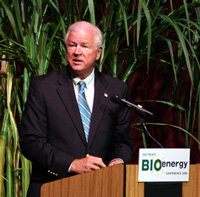Candidates for an open U.S. Senate seat in Nebraska faced off at the state fair in Lincoln this weekend and ethanol was a topic of debate.
 Republican Mike Johanns, Democrat Scott Kleeb and Green Party candidate Steve Larrick all discussed the important issues of energy, climate change and renewable fuels – although most of the sparks flew between Johanns and Kleeb.
Republican Mike Johanns, Democrat Scott Kleeb and Green Party candidate Steve Larrick all discussed the important issues of energy, climate change and renewable fuels – although most of the sparks flew between Johanns and Kleeb.
Former Nebraska governor Johanns, who resigned as US Secretary of Agriculture last year to run for the Senate seat being vacated by Republican Chuck Hagel, accused Kleeb of being quoted as saying that “corn based ethanol will not be a part of our future.” Johanns noted that new breakthroughs in corn genetics will soon bring a 40 percent increase in the yield of dryland corn, making corn-based ethanol even more viable.
Kleeb claimed he was misquoted and has “always been a supporter of ethanol.” However, he believes the country also needs to develop other “green” energy solutions, such as solar, wind and other technologies such as cellulosic ethanol production.
The biggest clash between the two came over the proposed Warner-Lieberman Climate Security Act, which Johanns opposes and Kleeb supports.


 Motorsports legend Jack Roush joined a group of auto company executives, fleet operators and propane marketers to demostrate to the press and public some propane-fueled vehicles in New York City.
Motorsports legend Jack Roush joined a group of auto company executives, fleet operators and propane marketers to demostrate to the press and public some propane-fueled vehicles in New York City. “Aside from its superb engineering, this F-150 is a propane alternative-fueled vehicle that has an established refueling infrastructure to support it,” said Jack Roush, chairman of the board of Roush Enterprises and CEO and co-owner of Roush Fenway Racing, Livonia, Michigan. “It has lower greenhouse gas emissions than gasoline and diesel pickups and costs less to operate, and it contributes to the reduction of America’s dependency on foreign oil.”
“Aside from its superb engineering, this F-150 is a propane alternative-fueled vehicle that has an established refueling infrastructure to support it,” said Jack Roush, chairman of the board of Roush Enterprises and CEO and co-owner of Roush Fenway Racing, Livonia, Michigan. “It has lower greenhouse gas emissions than gasoline and diesel pickups and costs less to operate, and it contributes to the reduction of America’s dependency on foreign oil.”
 A new study from Purdue University shows that buses that have been running 10 percent biodiesel are reducing pollution without any loss of fuel economy.
A new study from Purdue University shows that buses that have been running 10 percent biodiesel are reducing pollution without any loss of fuel economy.  The National Biodiesel Board has teamed up with two companies to launch a pilot program to show how much lower emissions are using biodiesel. NBB, along with Chicago-based Indigenous Energy, LLC, developers of emissions tracking systems, and Los Angeles-based States Logistics, a fleet and logistics company using clean technology, to put together the six-month over-the-road test.
The National Biodiesel Board has teamed up with two companies to launch a pilot program to show how much lower emissions are using biodiesel. NBB, along with Chicago-based Indigenous Energy, LLC, developers of emissions tracking systems, and Los Angeles-based States Logistics, a fleet and logistics company using clean technology, to put together the six-month over-the-road test. Senator Saxby Chambliss of Georgia is proud that his home state is playing a role in the production of alternative, domestic fuels.
Senator Saxby Chambliss of Georgia is proud that his home state is playing a role in the production of alternative, domestic fuels. “Continuing to develop renewable energy is a key component of President Bush’s strategy to reduce America’s dependence on foreign oil,” Dorr said. “This meeting is an opportunity for business owners, citizens and agricultural producers to discuss the best ways to harness the untapped renewable energy resources in rural areas.”
“Continuing to develop renewable energy is a key component of President Bush’s strategy to reduce America’s dependence on foreign oil,” Dorr said. “This meeting is an opportunity for business owners, citizens and agricultural producers to discuss the best ways to harness the untapped renewable energy resources in rural areas.”  Iowa-based Renewable Energy Group has announced it has the technology to produce biodiesel from algae on a commercial scale.
Iowa-based Renewable Energy Group has announced it has the technology to produce biodiesel from algae on a commercial scale. Lake Erie Biofuels, the Pennsylvania biodiesel maker with a 45-million gallon a year biodiesel refinery on the shores of Lake Erie (so it’s not just a clever title) is reportedly considering building a pipeline from its plant to the ports of Erie, PA… but company officials aren’t saying much about the project.
Lake Erie Biofuels, the Pennsylvania biodiesel maker with a 45-million gallon a year biodiesel refinery on the shores of Lake Erie (so it’s not just a clever title) is reportedly considering building a pipeline from its plant to the ports of Erie, PA… but company officials aren’t saying much about the project. The
The